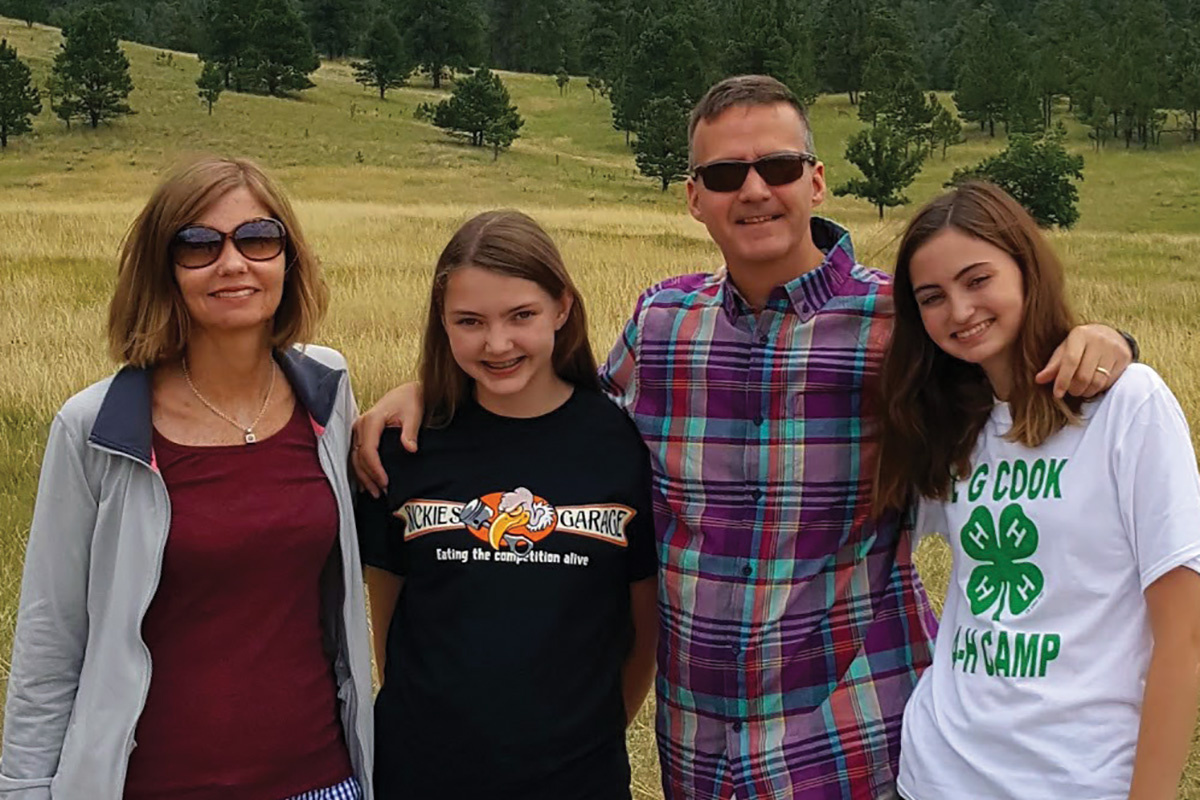
Since being diagnosed with metastatic lung cancer, Garth Atchley has run three ultramarathons, two marathons, and several other races. He raises money for Fred’s Team, which supports research at MSK. This photo was taken in front of MSK during the New York Road Runners NYC Half Marathon in March 2019. Photo: Fred’s Team
Garth Atchley had just returned from a vacation to Yellowstone National Park with his wife and two teenage daughters when he realized something wasn’t right. The 47-year-old ultramarathoner didn’t have the energy to go running. He also felt unsteady on his feet, almost like he had vertigo.
He tried new glasses and saw a doctor for his allergies, but there was no improvement. So, he made an appointment with a neurologist near his home in Jersey City, New Jersey. An MRI revealed devastating news: He had a brain tumor, and it was metastatic — the result of an undiagnosed cancer that had started in his lungs. Just two days later, he had brain surgery at a local hospital.
“When I look back now to that time, it feels like a blur,” Garth says. “My wife, Judy, and my sister-in-law, Mary, who is a nurse, stepped in and made sure that I was getting the best care possible. They decided I needed to go to Memorial Sloan Kettering.”
On his first visit to MSK, he met thoracic medical oncologist Helena Yu and immediately felt a rapport. She explained that she would send a sample of his brain tumor for molecular testing with MSK-IMPACTTM. This test looks for changes in more than 500 genes linked to cancer so patients can be treated with precisely the right drug.
Nearly four years later, Garth is a testament to how far cancer science has advanced to keep ahead of cells that are constantly changing to outsmart treatment.
Targeted Therapies Lead to New Treatment Options
“Garth’s story illustrates the fact that we’re always trying to offer more for our patients — to go beyond what’s considered standard therapy,” Dr. Yu says. “Molecular testing is a crucial part of figuring out those next steps.”
Shortly after Garth’s tumor samples were submitted for testing, he was walking near his office in Midtown Manhattan, where he works for a global shipping and logistics company, when Dr. Yu called with the first good news in weeks. His MSK-IMPACT results were not back yet, but another preliminary molecular test had revealed his cancer had a mutation in a gene called EGFR. “She told me that having this mutation was like winning the lottery,” he says.

Garth Atchley with his wife, Judy, and his daughters, Jude (left) and Mary (right), on vacation in Wyoming in July 2017, just before he was diagnosed with cancer. Photo: Garth Atchley
It meant he wouldn’t need chemotherapy. Instead, he immediately began treatment with a targeted therapy aimed at his mutation, a daily pill called osimertinib (Tagrisso®).
It also meant the radiation for his brain tumors could be scaled back to just a few treatments. (Later, to destroy cancer that had spread to his liver, Garth also received selective internal radiation therapy. MSK interventional radiologist Etay Ziv inserted small radioactive seeds through a catheter placed near the site of Garth’s tumor.)
Staying Ahead of Cancer’s Evolution
Molecular testing of tumors has made a monumental difference for people like Garth. MSK-IMPACT and other genetic tests enable patients to be matched with targeted therapies that counteract the mutations driving the growth of their tumors. Unfortunately, though, tumors often find ways to stop responding to medication.
“Tumors learn from the very beginning that the way to survive is by increasing their genetic diversity. We call this intratumor heterogeneity, and it is one of the main drivers of resistance to therapies,” says MSK physician-scientist Pedram Razavi, who specializes in breast cancer. “The tumor’s ability to evolve is the main challenge we have in treating metastatic cancers.”
Unfortunately, that’s what happened to Garth. After 16 months on osimertinib, when he was feeling almost back to his normal life, his cancer began spreading again. A biopsy of lymph node tumors revealed an additional mutation.

Medical oncologist Helena Yu specializes in finding the best targeted therapy treatments for people with lung cancer.
“When you learn your disease has progressed, it’s scary,” Garth says. “Although I have stage IV cancer, Dr. Yu has never talked to me about prognosis. She has always been so reassuring, letting me know if something happens, there are more options that we can try.”
Dr. Yu enrolled him in a trial for a drug called dacomitinib (Vizimpro®), which targeted the new mutation. It worked for an additional six months. But once more, his cancer stopped responding. Doctors then prescribed chemotherapy. Another biopsy of the lymph nodes in his armpit uncovered more molecular changes. The results were astonishing. He had lost the mutation that caused resistance to the first drug — osimertinib — and picked up another mutation that would make his “miracle drug” work again. He’s has been taking his second course of osimertinib since January 2020. His tumors have shown no signs of further growth.
“I’m a big advocate of getting genetic testing more than once, especially if you have tumor progression or something else changes,” Garth says. “What I’ve learned is that the mutations in your tumors are not always fixed.”
The Next Frontier of Molecular Testing
Although Garth was able to have multiple tissue biopsies, that’s not the case for many patients due to the location or number of metastases. Liquid biopsies, which can detect tumor DNA shed into the bloodstream, are a promising new advancement for addressing that need.
MSK has developed its own liquid biopsy test, called MSK-ACCESS, which looks for more than 100 mutations in tumor DNA in the blood.
MSK’s liquid biopsy test looks for more than 100 mutations in tumor DNA in the blood.
“Developing liquid biopsies is an important part of our efforts in treating metastatic cancer,” Dr. Razavi says. “Being able to learn about cancer mutations from a simple blood draw is easier for patients. Additionally, because tumors that spread to different sites may undergo different evolutionary pathways, liquid biopsies can often help us to get a more complete picture and to more easily monitor the evolution of the disease.”
In addition to taking osimertinib, Garth, who will turn 51 in July, now gets a low dose of chemotherapy every three weeks. “I’m not totally used to it, but you get into a rhythm,” he says. “You know you won’t feel great for a few days after chemo, so you just plan around it.”
Garth has resumed running and now raises money for MSK through Fred’s Team. His family also goes camping several times a year and hiking whenever they get the chance.
“Treatment has given me the opportunity to enjoy so many important things in my life,” he says. “Since we got married, my wife and I have gone to Long Beach Island, New Jersey, for two weeks every summer. But for the past three years, we’ve rented a place there for the whole season. My daughters have summer jobs on the island, and they get to spend time with their friends. It’s really our happy place.”







